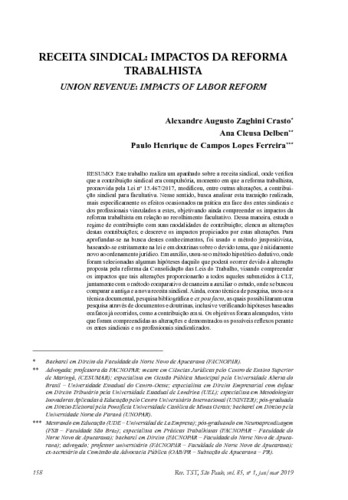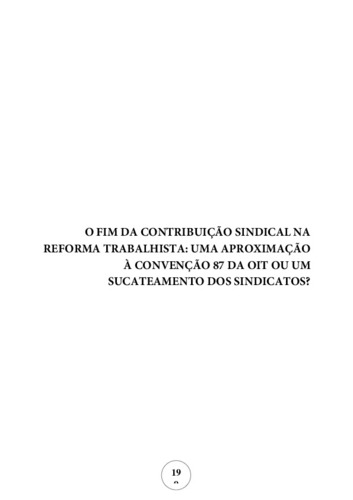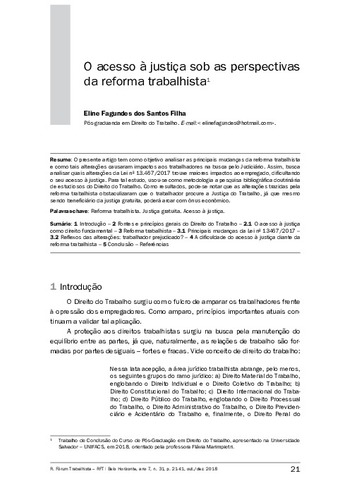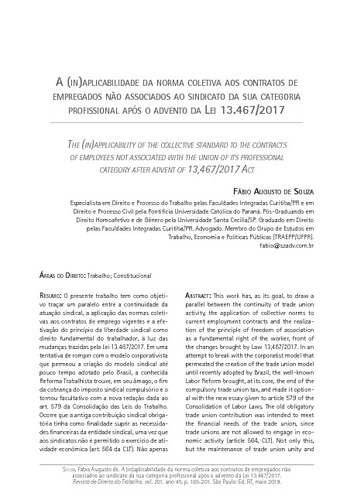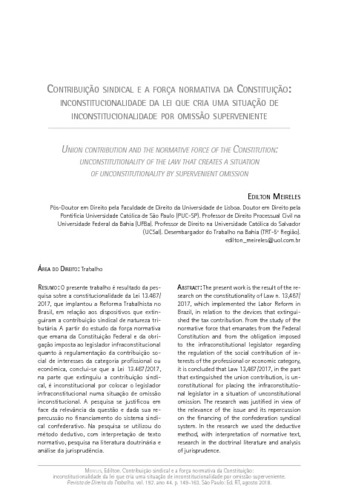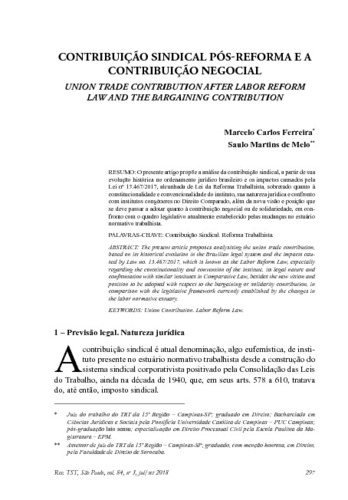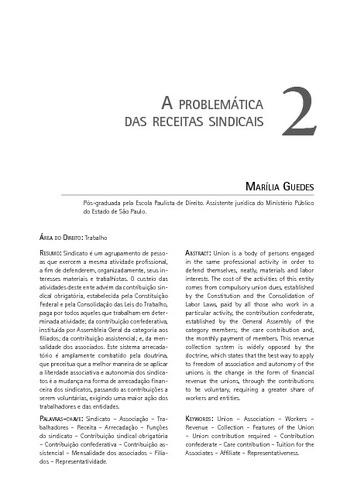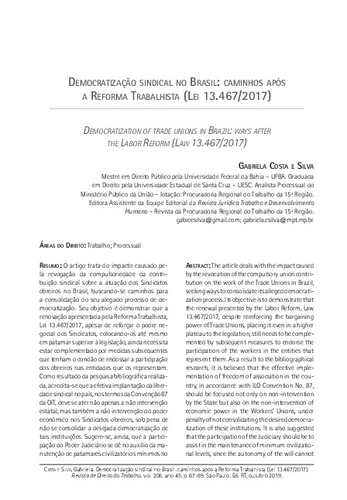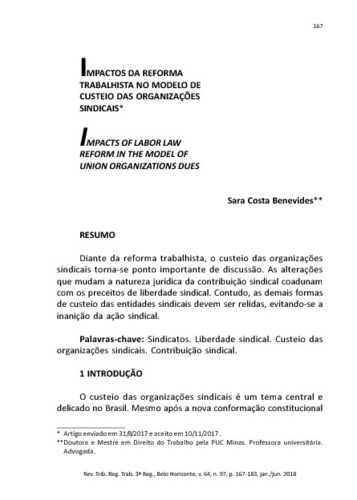Artigo de periódico
Receita sindical: impactos da reforma trabalhista
| dc.contributor.author | Crasto, Alexandre Augusto Zaghini | |
| dc.contributor.author | Delben, Ana Cleusa | |
| dc.contributor.author | Ferreira, Paulo Henrique de Campos Lopes | |
| dc.date.accessioned | 2019-06-19T11:01:39Z | |
| dc.date.available | 2019-06-19T11:01:39Z | |
| dc.date.issued | 2019-03 | |
| dc.identifier.citation | CRASTO, Alexandre Augusto Zaghini; DELBEN, Ana Cleusa; FERREIRA, Paulo Henrique de Campos Lopes. Receita sindical: impactos da reforma trabalhista = Union revenue: impacts of labor reform. Revista do Tribunal Superior do Trabalho, São Paulo, v. 85, n. 1, p. 158-184, jan./mar. 2019. | pt_BR |
| dc.identifier.uri | https://hdl.handle.net/20.500.12178/157115 | |
| dc.description.abstract | [por] Realiza um apanhado sobre a receita sindical, onde verifica que a contribuição sindical era compulsória, momento em que a reforma trabalhista, promovida pela Lei n. 13.467/2017, modificou, entre outras alterações, a contribuição sindical para facultativa. Nesse sentido, busca analisar esta transição realizada, mais especificamente os efeitos ocasionados na prática em face dos entes sindicais e dos profissionais vinculados a estes, objetivando ainda compreender os impactos da reforma trabalhista em relação ao recolhimento facultativo. Dessa maneira, estuda o regime de contribuição com suas modalidades de contribuição; elenca as alterações destas contribuições; e descreve os impactos propiciados por estas alterações. Para aprofundar-se na busca destes conhecimentos, foi usado o método juspositivista, baseando-se estritamente na lei e em doutrinas sobre o devido tema, que é nitidamente novo ao ordenamento jurídico. Em auxílio, usou-se o método hipotético-dedutivo, onde foram selecionadas algumas hipóteses daquilo que poderá ocorrer devido à alteração proposta pela reforma da Consolidação das Leis do Trabalho, visando compreender os impactos que tais alterações proporcionarão a todos aqueles submetidos à CLT, juntamente com o método comparativo de maneira a auxiliar o estudo, onde se buscou comparar a antiga e a nova receita sindical. Ainda, como técnica de pesquisa, usou-se a técnica documental, pesquisa bibliográfica e ex post facto, as quais possibilitaram uma pesquisa através de documentos e doutrinas, inclusive verificando hipóteses baseadas em fatos já ocorridos, como a contribuição em si. Os objetivos foram alcançados, visto que foram compreendidas as alterações e demonstrados os possíveis reflexos perante os entes sindicais e os profissionais sindicalizados. | pt_BR |
| dc.description.abstract | [eng] This paper makes a survey on the Union Revenue, where it verifies that the union contribution was compulsory, at which point the labor reform, promoted by Law no. 13,467/1207, modified, among other changes, the union contribution to a voluntary one. In this sense, it seeks to analyze this transition, more specifically the effects occasioned in practice by trade unions and professionals linked to them, with the objective of understanding the impacts of the labor reform in relation to the voluntary collection. In this way, it studies the contribution regime with its contribution modalities; changes in these contributions; and describes the impacts of these changes. To deepen the search for this knowledge, the juspositivist method had been used, based strictly on the law and doctrines on the due subject that is clearly new to the legal order. The hypothetical-deductive method was used to help in which some hypotheses were selected on the subject of what may occur due to the amendment proposed by the Consolidation of Labor Laws, in order to understand the impacts that such changes will give to all those submitted to the CLT, along with the Comparative method in order to aid the study, where we tried to compare the old and the new Union Revenue. Also, as a research technique, the documentary technique, bibliographic research and ex post facto were used in which they enabled a research through documents and doctrines, including verifying hypotheses based on facts already occurred, such as the contribution itself. The objectives were achieved, since the changes had been understood and demonstrated possible reflections before the unions and unionized professionals. | pt_BR |
| dc.description.tableofcontents | Organização sindical -- Receitas sindicais -- Alteração promovida pela reforma | pt_BR |
| dc.language.iso | pt_BR | pt_BR |
| dc.relation | Brasil. Lei n. 13.467, de 13 de julho de 2017 | pt_BR |
| dc.relation.ispartof | Revista do Tribunal Superior do Trabalho: vol. 85, n. 1 (jan./mar. 2019) | pt_BR |
| dc.relation.uri | https://www.lexml.gov.br/urn/urn:lex:br:federal:lei:2017-07-13;13467 | pt_BR |
| dc.subject | Contribuição sindical, Brasil | pt_BR |
| dc.subject | Reforma trabalhista, Brasil | pt_BR |
| dc.subject | Sindicalismo, Brasil | pt_BR |
| dc.subject | Legislação trabalhista, alteração, Brasil | pt_BR |
| dc.title | Receita sindical: impactos da reforma trabalhista | pt_BR |
| dc.title.alternative | Union revenue: impacts of labor reform | pt_BR |
| dc.type.genre | Artigo de periódico | pt_BR |
| dc.identifier.rvbisys | 001148848 | |
| dc.relation.ispartoflink | https://hdl.handle.net/20.500.12178/156990 | pt_BR |
Coleção
-
Artigos9570


